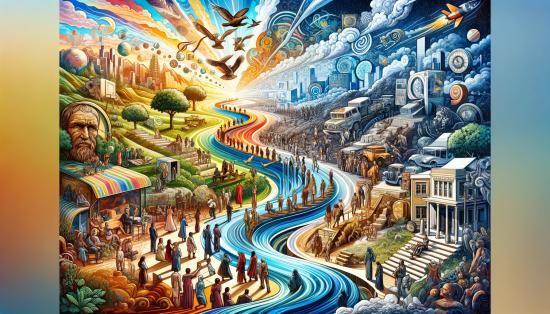
Evolving Norms: A Journey Through Societal Change
Explore the forces of change in society: technology, culture, economy, politics, and history. Gain insights into societal evolution.
Introduction to how society changes over time. Society is a dynamic entity that constantly evolves and adapts to new circumstances and influences. Understanding the mechanisms through which this transformation occurs is crucial for grasping the complexity of human interaction and cultural development. As we delve into the various factors that drive societal change, we will explore the significance of technological advancements, cultural shifts, economic dynamics, and political movements in shaping the fabric of society. By examining historical events and movements such as the Industrial Revolution, we can gain valuable insights into the profound impact that revolutionary ideas and globalization have had on societal values and norms. Through this journey, we will reflect on the importance of historical perspective in comprehending the current dynamics of society and the importance of embracing change as an inevitable part of human progress.
Defining society and its importance in historical context is crucial to understanding the development of human civilization. Society can be defined as a group of individuals living together in a community and sharing a common culture, values, and norms. Throughout history, societies have evolved and changed in response to various factors such as technological advancements, cultural shifts, economic changes, political movements, and revolutionary ideas. The study of society in historical context helps us understand the roots of current societal dynamics and how they have been shaped by past events and influences. By examining the historical development of societal norms, values, and structures, we gain valuable insights into the forces that have driven and continue to drive societal change.
The role of technology in accelerating societal change cannot be overlooked. Throughout history, the adoption and advancement of technology have had a profound impact on the way societies evolve. From the invention of the printing press to the rise of the internet, technology has fundamentally altered the way people communicate, work, and interact with one another. The Industrial Revolution, for example, ushered in a new era of industrialization and urbanization, transforming agrarian societies into industrial powerhouses. This shift not only revolutionized the way goods were produced but also redefined social structures, leading to the creation of new social classes and the emergence of modern urban centers. Similarly, the digital revolution has significantly transformed the way people access and disseminate information, breaking down geographical barriers and connecting people from diverse backgrounds. As technology continues to evolve at a rapid pace, its influence on societal change will only become more pronounced, presenting both opportunities and challenges for the future.
Cultural shifts have played a crucial role in shaping societal norms throughout history. As societies evolve, so do their values, beliefs, and customs, reflecting the changing dynamics of the world. Whether it's the influence of art, literature, music, or technological advancements, cultural shifts have the power to challenge and redefine societal norms. For example, the counterculture movement of the 1960s challenged traditional social norms, promoting ideas of peace, love, and equality. Similarly, the rise of social media has led to a shift in societal norms regarding privacy, communication, and social interactions. These cultural shifts influence societal norms by introducing new ideas, challenging existing beliefs, and shaping the collective consciousness of a society.
Economic factors play a pivotal role in shaping and reshaping society. Throughout history, the rise and fall of economies have had a profound impact on the social structures, values, and norms of communities and civilizations. The distribution of wealth, access to resources, and economic opportunities can determine the quality of life for individuals and dictate the overall dynamics of a society. Economic inequality, for example, can lead to social unrest and class divisions, while economic prosperity can foster a sense of stability and unity within a community. Furthermore, economic shifts, such as the transition from agrarian to industrial economies, have historically transformed social structures and redefined the roles and relationships among different societal groups. From the ancient trade routes to the modern global economy, economic factors continue to shape human interactions, cultural practices, and societal norms.
Political movements have played a key role in shaping the structures of societies throughout history. From revolutions to social reforms, political movements have influenced the distribution of power, the establishment of laws, and the protection of rights within communities. The French Revolution, for example, led to the rise of democratic ideals and the pursuit of equality, which drastically transformed the social hierarchy and political systems in France. Similarly, the Civil Rights Movement in the United States challenged racial segregation and discrimination, ultimately leading to legislative changes and a shift in societal attitudes towards racial equality. These examples illustrate the profound impact of political movements on social structures, as they have the power to dismantle existing norms and institutions while advocating for the establishment of new societal paradigms.
The Industrial Revolution was a period of profound social and economic transformation that had a lasting impact on society. This era saw the transition from agrarian and rural-based economies to industrial and urban-centered societies, leading to significant changes in social structures, labor practices, and living conditions. The rapid advancements in technology, such as the steam engine and mechanized manufacturing, revolutionized the way goods were produced and led to the rise of factory-based industries. As a result, there was a massive migration of people from rural areas to cities in search of employment opportunities, which consequently reshaped the demographic and cultural landscape of society. The Industrial Revolution also brought about new social classes, with an emerging middle class and a growing working class, each with its own set of values, aspirations, and challenges. This period serves as a case study in understanding how technological innovations and economic developments can drive societal transformation and influence the way people live, work, and interact with one another.
Revolutionary ideas have long been catalysts for significant shifts in societal values. Throughout history, the introduction of revolutionary concepts has challenged traditional norms, reshaped cultural practices, and redefined the way people live and interact with one another. From the Enlightenment era's emphasis on reason and individual freedom to the feminist movement's demand for gender equality, these innovative ideas have had a profound impact on societal structures and norms. They have sparked debates, inspired social movements, and ultimately contributed to the evolution of human civilization. By examining the influence of revolutionary ideas on societal values, we gain a deeper understanding of the forces that drive societal change and the importance of embracing progress while respecting the traditions that shape our collective identities.
Globalization has had a profound impact on cultural and societal integration, reshaping the way people perceive foreign cultures and interact with one another. The interconnectedness of the modern world has led to the diffusion of cultural practices, languages, and traditions across borders, contributing to a more cosmopolitan and multicultural society. The exchange of ideas, values, and beliefs has fostered a greater understanding and acceptance of diversity, leading to the emergence of new hybrid cultures and the blurring of traditional societal boundaries. However, globalization has also sparked debates about the homogenization of culture and the loss of local traditions, as global influences often pose a challenge to the preservation of unique cultural identities. As a result, societal integration has been both enriched and challenged by the forces of globalization, raising complex questions about the balance between cultural diversity and global unity.
Understanding current societal dynamics requires a deep reflection on historical perspectives, as history provides valuable insights into the factors that shape and reshape human civilization. By examining the ways in which society has evolved over time, we can gain a better understanding of the various influences on contemporary social structures, values, and behaviors. Historical context helps to elucidate the root causes of societal issues and challenges, shedding light on the complex interplay of cultural, economic, political, and technological forces that drive societal change. Moreover, historical perspectives enable us to appreciate the progression of societal norms and values, allowing us to discern the patterns and trends that have shaped the societies we live in today. By embracing historical insights, we can develop a more nuanced and empathetic understanding of the complexities of contemporary societal dynamics.
Related posts



